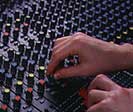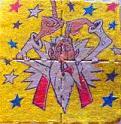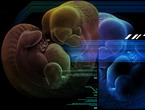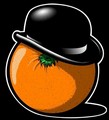| Author
|
The Mother of all SOUNDCARDS thread
|
Freeflow
IsraTrance Full Member

Started Topics :
60
Posts :
3709
Posted : Dec 11, 2005 23:44
|
Hey music makers!
wouldnt it be good to have a soundcard thread where everyone can elaborate on souncards and interfaces and everything that has to do with getting sound into the computers and stuff like that...
So Firewire users can post their experiences and Usb users and Pci users can post their experiences...
i dont know much about these things and i think alot of us wants to know more!
so if some tech-head could make a post and explain the most common things in analog to digital recording and what options there are and stuff about A/D converters, Midi interfaces,
word clock, SMPTE, S/PDIF... and more
it would be real helpful for me and i bet alot of others...
can we get this show started or is there no interest?
Love And Light
|

|
|
e-motion
IsraTrance Full Member

Started Topics :
71
Posts :
933
Posted : Dec 12, 2005 00:03
|
|
i can start. is audiophile 2496 a good buy? or is something better in the same price range? |

|
|
Freeflow
IsraTrance Full Member

Started Topics :
60
Posts :
3709
Posted : Dec 12, 2005 00:37
|
Well maybe i can answer that, but as i have nothing else to compare to it would be sensless...
but here goes:
Audiophile 2496 is a good card, and it will probably deliver what it say it will deliver....
no latency issues, pretty stable drivers.
no stuttering or cut outs at normal cpu usage...
audiophile is classic and its a good card if you dont need much in or out except stereo in and stereo out or two mono in and one stereo out...
but i bet there are competitors that will deliver a good and stable card with more features...
Anyway maybe not the best answer but im not a tech-head so i cant give you thecnical specfications..
i want this to be a thread where users tells us about their cards, not ask question about cards...
and somewhere in this thread i would love for someone to explain almost everything about soudcards and what we should be thinking of..
do you understand me? so if we can make a thread where we present more facts instead of questions it would be great....
in the end of this thread i think you and I will have more answers e-motion...
if we can get some techy gear-heads in here with lots of experience or just abit....
this could become a great thread for all of us who want to buy soundcards....
again are you with me on this? anything unclear? 
|

|
|
Get-a-fix
Getafix

Started Topics :
147
Posts :
1441
Posted : Dec 12, 2005 02:01
|
I think nolightatend has said pretty much everything we need to know about the technical side of it..So i'll stick to my experience with my M-audio firewire audiophile...
Sound quality-wise its pretty decent..For some reason i get a lot of latency in fruity with my midi-controller..But with cubase it works great..It sometimes has glitches (pops,crackles,stutters) even with the latest drivers installed..
Overall i'd say it does the job for its price..But i would suggest saving up and buying a more stable card!
        http://www.soundcloud.com/getafixmusic http://www.soundcloud.com/getafixmusic |

|
|
Terrafractyl
Terrafractyl

Started Topics :
12
Posts :
85
Posted : Dec 12, 2005 08:55
|
Its also probably worth noting the different speeds of the different standards, as far as I know it is something like this
1. pci/pcimia cards(fastest)
2. Firewire 800
3. Usb 2
4. Firewire 400
5. Usb 1(slowest)
Also worth casting your eye over in the tech specs of a card, THD(total harmonic distortion) and dynamic range.
|

|
|
Freeflow
IsraTrance Full Member

Started Topics :
60
Posts :
3709
Posted : Dec 13, 2005 02:30
|
Quote:
|
On 2005-12-12 00:40, nolightatend wrote:
My thoughts
Now for any who seek sound card, please read this, if someone wants to correct me please do it in gentle manner since some of my words will be subjective, thou i will clearly show it.
There are many sound cards available on market today, some are called professional audio cards, some not professional. We tend as musician to stick with professional audio interfaces so i will cover these cards only.
Glossary before we start:
A/D Converter or Convertor (depends area you live in) - Is device which convert Analogue (constant waves) to Digital (numbers) forward and backwards. It translates signal so digital analogue systems could understand each other, this is very important part of sound card and it is probably the most expensive part of it, since precision of that device can make large difference on input and output signal
DSP - Digital Signal Proccesing, this device available on most of cards today, this is chipset which handle software on it to help our sound cards to process data faster. DSP can be basic, which contain mixer with virtual channels and analyzing tools or handle synthesizers, effects etc..
Chipset abilities are limited, so this card can only help but it has limitation if you use too much of is power, although it could ease on CPU.
Inputs/Outputs - this is basically things you need to connect external audio devices to computer for recording and out signal to mixing panel or monitor. this is where A/D converter comes to main role, since it's the main feature along with quality of cables.
Midi Interface - Device which connect MIDI to your sound card, most of today's synthesizer are digital and even analogue ones have boxes which convert soignal for flexible usage with MIDI in our sequencers.
Latency/DMA Buffer - This is time (latency) how fast your sound card respond to action made whether it is internal or external. DMA Buffer is an opposite, how much buffer you give to process. Professional cards try to beat the time with low latency (1+ms) while in reality we can't hear that difference and it almost can't be spotted so most of us work on 18-30ms latency, why? Because faster processing requires more resources if you understood what DMA buffer means.
Bit Depth and Sample Rate - This are restriction for your sound card ability to record and sometime to process data. For example if your card specified as 96/24, means it can record at 96khz with 24bit resolution. Quite neat, right? most of the studios use this setup these days. It doesn't mean you can't listen or process 32bit data on your computer, just outputs and inputs limited to 24bit.
Ok once i've explaned basic stuff in basic language, let's try to understand what we seek for so we won't ask "Which card to buy question".
Answer these questions to yourself before you buy:
Q.How much inputs and outputs i need?
A. Depends how much hardware you gonna plugin,
way of you mixing becasue you can send specific channel to mixing console so more outputs will be needed to make this faster. Also decide if you want clean in/out in hardware rack or just as cables.
Q.Do i need MIDI interface?
A.Yes, probably if you already own synthesizer or prepare to get once in near future, if not do not waste your money on card with MIDI Inteface since you can always buy it seperated with more in/outs probably.
Q.Do i need card with Zero latency?
A.There is no Zero latency, even best cards have some latency. With modern technology VST/DX and rest of units we have today require alot of system resources so we translate system resources and use higher latency to cover CPU everload, since we can't hear that latency unless it is higher that XXms it is doesn't matter if latency is "zero" or 13ms.
Q.Do i need complex DSP?
A.DSP can ease on CPU but the same time not many cards with DSP allow reprogramming so you can add instruments and effect to them. So it's limited sometimes to use these DSP components over and over, although expensive cards like "Creamware" have enough tools to work with and ability to be reprogrammed. Another DSP feature is virtual channel, like RME cards offer. These channels can be used to direct link audio channels inside of your Pc or to other Pc with single cable. Although this feature requires system resources as much more channels you have more your Pc will be loaded.
New Era Scientist,
I've thought about this idea today once you started to answer to some guy here and he was asking pretty amateur question "What card to buy? I've heard XXX cards are good without saying why!"
http://en.wikipedia.org/wiki/Analog_to_digital_converter
e-motion,
I would go for EMu 0404, bit more money 30$ or so but it has DSP effects which can reduce CPU usage, moreover i have bad experience with Audiophile 24/96 and some friends of mine too, Cracks and Clicks at record, alot of IRQ conflicts with everything. Just not that good M-Audio card.
Anyway there are ESI cards at the same price range, thou never tried any.
|
|
Quote:
|
On 2005-12-12 08:55, Terrafractyl wrote:
Its also probably worth noting the different speeds of the different standards, as far as I know it is something like this
1. pci/pcimia cards(fastest)
2. Firewire 800
3. Usb 2
4. Firewire 400
5. Usb 1(slowest)
Also worth casting your eye over in the tech specs of a card, THD(total harmonic distortion) and dynamic range.
|
|
Very nice 
this is just what i need... and maybe somebody else aswell 
maybe we can expand it more.. |

|
|
The Tree Tribe
IsraTrance Junior Member

Started Topics :
36
Posts :
580
Posted : Dec 13, 2005 17:36
|
|
Hmm, I'm also shopping around for a PCMCIA card for my notebook, can you guys recommend any brands (so that I can check out their websites). So far, I only know of the Creative Audigy 2 and the Echo Indigo... |

|
|
tHuJoN
Freakulizer / Khainz

Started Topics :
115
Posts :
932
Posted : Dec 14, 2005 04:34
|
|
texmex

Started Topics :
5
Posts :
189
Posted : Dec 14, 2005 06:12
|
Few words about latencies.
First no matter how low latency your card can give you, it's no use if you're running in high cpu load. The shorter the latency, the shorter the audio buffer will be and more frequently you cpu must fill that buffer. If the cpu load is large, the cpu might every now and then miss the update (some other programs need time too, you know), causing hearable clicks and pops in the audio signal. This doesn't affect the final rendering of the waveform in the sequencer, though (export in cubase). So if you're determined to get low latency, get a powerful cpu too. Something betweem 5 and 10 ms is quite usable in my opinion. With 2 ms you very quickly start hearing the clicks. And if you don't play/record midi live/use ASIO monitoring (real-time quitar effects and so on), you can have latency of 20 ms or more.
Then there is midi latency. This matter isn't discussed much nowadays, but it can become an issue when you want to hook your hardware synths to your sequencer and run vst synths sametime. With PCI and pcmcia cards the latency is usually very low (1-3 ms), but with usb and firewire it can be a lot more. I don't know why. I have 9 ms (probably the highest any firewire device has?...) and it really makes vst+hw synth composition pain in the ass. Fortunately the latest version of cubase sx (3.1) has something called external midi instruments, which makes your synths look like vst's. And there is latency compensation which is very useful. I actually got aprs from hw synths run almost exact sync with vst ones!
There is also midi jitter, which can be far more problematic than the latency because it's impossible to fix. There is no such thing as jitter compensation. So get a device that has low jitter (luckily I have very very low jitter - something good of TerraTec Phase 88 Firewire  ) )
Here are few links of interest (especially the last one is interesting, a tool for measuring midi latency and jitter):
http://tinyurl.com/9k2xe (to SOS forums)
http://www.soundonsound.com/sos/Oct02/articles/pcmusician1002.asp
http://www.soundonsound.com/sos/Oct04/articles/qa1004-7.htm
http://www.soundonsound.com/sos/Sep02/articles/pcmusician0902.asp?session=6406b15fdffc5cf2e12250e471bc1116
http://www.soundonsound.com/sos/apr04/articles/pcnotes.htm
http://earthvegaconnection.com/evc/products/miditest/
If you use only vst's and maybe use controller for parameter tweaking, latency is no issue as long as it's under something decent like 20 ms. Concentrate on high quality outputs (balanced).
If you use midi controller to record notes, get card with stable midi latency (no jitter) and low latency for both audio and midi.
If you have hardware synths and only use sequencer for mixing or mix with hw mixer, have high quality inputs and outputs, preferably with low audio latency and stable midi.
If you're mixing hw synths with vst synths, you'll need it all: many inputs, low and stable midi and audio latency and high quality A/D converters.
I only have experience with TerraTec's Phase 88 Firewire Rack, and so far it's been good. It has 8 balanced inputs and outputs, spdif and 2 x midi io. The midi latency is a bit much, but otherwise it's a good soundcard.
And for the love of god(?), do never ever buy anything from Creative! 
|

|
|
Nobita
IsraTrance Junior Member

Started Topics :
30
Posts :
371
Posted : Dec 14, 2005 17:50
|
Nice thread, could someone recommend good external sound cards which provides pretty low latency?
        Row row row your boats gently down the stream; merrily merrily merrily merrily life is but a dream. Row row row your boats gently down the stream; merrily merrily merrily merrily life is but a dream. |

|
|
Terrafractyl
Terrafractyl

Started Topics :
12
Posts :
85
Posted : Dec 15, 2005 06:05
|
The drivers that come with the card are also pretty important in relation to the performance of the card
the reason I say this is that ive been doin some research into sound cards while saving up to buy one, and came VERy close to buying a Emu card, but discovered this thread
http://www.kvraudio.com/forum/viewtopic.php?t=82303
which gave many doubts as I was buying it for a laptop and with live performance in mind...
I've also had some issues with m-audio drivers(new ones) that wouldn't even let my computer boot up, so no m-powered pro tools for me!
In the end I decided to save a bit more and get a RME multiface 2 as I found it near imossible to find anybody saying anything bad about them 
oh and emu's owned by creative which gave me a shock too
|

|
|
UnderTow

Started Topics :
9
Posts :
1448
Posted : Dec 18, 2005 23:34
|
Quote:
|
On 2005-12-12 08:55, Terrafractyl wrote:
Its also probably worth noting the different speeds of the different standards, as far as I know it is something like this
1. pci/pcimia cards(fastest)
2. Firewire 800
3. Usb 2
4. Firewire 400
5. Usb 1(slowest)
|
|
I think Firewire 400 usualy has lower latency than USB 2.0 but I could be wrong. Anyone know?
Quote:
|
Also worth casting your eye over in the tech specs of a card, THD(total harmonic distortion) and dynamic range.
|
|
A small word of caution here, some soundcard manufacturers quote the specifications of the chips used in the card from the chip manufacturer. They don't give the real specification of the chips + the analogue part of the converters.
UnderTow |

|
|
UnderTow

Started Topics :
9
Posts :
1448
Posted : Dec 18, 2005 23:39
|
Quote:
|
On 2005-12-15 06:05, Terrafractyl wrote:
The drivers that come with the card are also pretty important in relation to the performance of the card
the reason I say this is that ive been doin some research into sound cards while saving up to buy one, and came VERy close to buying a Emu card, but discovered this thread
http://www.kvraudio.com/forum/viewtopic.php?t=82303
which gave many doubts as I was buying it for a laptop and with live performance in mind...
oh and emu's owned by creative which gave me a shock too
|
|
Emu is one of the manufacturers that quote the specs of the chips. They make a big deal of having the same chips as Digidesign converters but fail to mention that the analogue section is different.
And yeah, part of the Emu cards originate from the Audigy card but the chips are covered by Emu stickers to hide that little bit of information.  This doesn't have to be a problem but never forget to take any marketing bla bla with a large pinch of salt! This doesn't have to be a problem but never forget to take any marketing bla bla with a large pinch of salt!
UnderTow |

|
|
UnderTow

Started Topics :
9
Posts :
1448
Posted : Dec 18, 2005 23:44
|
Quote:
|
On 2005-12-14 06:12, texmex wrote:
I only have experience with TerraTec's Phase 88 Firewire Rack, and so far it's been good. It has 8 balanced inputs and outputs, spdif and 2 x midi io. The midi latency is a bit much, but otherwise it's a good soundcard.
|
|
I still have an old Terratec EWS88MT in my home studio. (Same PCI card as the Phase88 but different breakout box). I am happy with the drivers of this card. That isn't really astonishing as this card (The PCI section) is 4 or 5 years old (Maybe even more). They have had plenty of time to iron out any bugs ... Also, because Terratec have a large consumer department, they have a huge testlab with practically any motherboard available to test their drivers with.
UnderTow |

|
|
orange
Fat Data

Started Topics :
154
Posts :
3918
Posted : Dec 19, 2005 17:10
|
Quote:
|
On 2005-12-18 23:44, UnderTow wrote:
Quote:
|
On 2005-12-14 06:12, texmex wrote:
I only have experience with TerraTec's Phase 88 Firewire Rack, and so far it's been good. It has 8 balanced inputs and outputs, spdif and 2 x midi io. The midi latency is a bit much, but otherwise it's a good soundcard.
|
|
I still have an old Terratec EWS88MT in my home studio. (Same PCI card as the Phase88 but different breakout box). I am happy with the drivers of this card. That isn't really astonishing as this card (The PCI section) is 4 or 5 years old (Maybe even more). They have had plenty of time to iron out any bugs ... Also, because Terratec have a large consumer department, they have a huge testlab with practically any motherboard available to test their drivers with.
UnderTow
|
|
i can only agree with undertow ive purchased and phase x24 fw for studio and live use and shes a very very stable and solid soundcard i have no complains att all shes soundz great and working like a breeze
good work terratec!!
ive finnaly get rid of the crappy emu 1212!!
orange
        http://www.landmark-recordings.com/ http://www.landmark-recordings.com/
http://soundcloud.com/kymamusic |

|
|
|